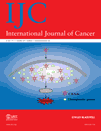Immunomodulatory IL-18 binding protein is produced by prostate cancer cells and its levels in urine and serum correlate with tumor status
Abstract
Cytokines may play a role in the initiation and progression of prostate cancer. A cytokine antibody array was previously applied to prostatic fluid obtained from patients with prostate cancer, and interleukin 18 binding protein (IL-18BP), a potent inhibitor of interleukin 18, was noted to be significantly upregulated in cases with large volume disease. We sought to further characterize the association of IL-18BP with prostate cancer and determine whether IL-18BP levels in patient serum and urine samples had clinical relevance. IL-18BP was expressed and secreted by the prostate cancer cell lines DU145 and PC3 but not by LNCaP and CWR22, upon interferon-γ (IFN-γ) stimulation. IFN-γ-induced secretion of IL-18BP was enhanced by added TNF-α, IFN-α and IFN-β. The IL-18BP secreted from DU145 and PC3 functionally inhibited IL-18. Immunohistochemical analyses showed positive IL-18BP staining in prostate cancer cells as well as in macrophages in radical prostatectomy specimens. Significant differences in urinary IL-18BP levels (normalized by total protein) collected post-DRE were found between cases with and without cancer on biopsy (p = 0.02) and serum IL-18BP levels correlated with Gleason score (p = 0.03). Our finding of elevated IL-18BP secretion from prostate cancer cells suggests an attempt by cancer to escape immune surveillance. IL-18BP merits further study as a marker of aggressive prostate cancer and as a therapeutic target.




